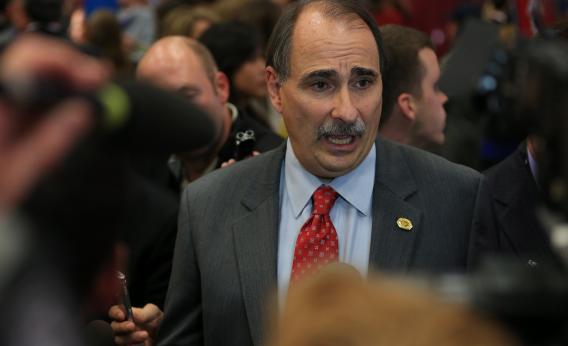DENVER—This is what losing looks like: five stoic strategists for the Obama campaign camped out in the spin room. They do not deny that Mitt Romney just beat the president on all the points that count in TV debates. How can they, when even the foreign press, heavy in accent and fond of existential questions, keeps asking why the president blew it? In one corner stands David Plouffe, the president’s chief strategist, fielding question after question about optics.
“Why wasn’t the president more aggressive?” asks a dark-suited man with a Swedish accent.
“The president did exactly what he had to do,” says Plouffe. “He talked in very deep specifics about the economy, about jobs, about Medicare. That’s why he had a good debate tonight.”
“Would you agree that he was too low-key?” asks a Japanese reporter.
“No!” says Plouffe. “I would not agree with that at all! He did what he had to do. He had a very clear message to the American people.”
Somebody asks Plouffe if tonight was a “decisive” debate. “We don’t believe in decisive moments,” says the man whose candidate rose to power on the strength of speeches that were sold as collector’s item DVDs.
This would sound ridiculous anywhere. In the big dumb swirl of a spin room, where men of clout and class walk around next to popsicle-looking sticks bearing their names, it’s positively Dali-esque. This is an atmosphere where a reporter can yell, “Was tonight a game-changer?” at David Axelrod, and nobody will laugh.
But for the first time in 12 years, Democrats have to take a debate that they lost on optics and convince voters that they won on facts. For months, they’ve had great fun with the holes in Mitt Romney and Paul Ryan’s economic plans. It’s hard to worry about those holes in a debate. The candidate can throw out numbers and the word plan, which voters associate with the actual having of plans. The attacker has to command enough facts, simultaneously, to prove that rival wrong, live. And he has to look nice doing it.
If you fail, you take the demolition job into the next news cycle. The Obama campaign tries to do that in just the way George W. Bush’s campaign did after the first debate with John Kerry. “The challenger always gets some benefit from standing next to the president,” says David Axelrod. “Tomorrow, when everyone wakes up and realizes what Gov. Romney said—yes, he is for turning Medicare into a voucher program, no he won’t accept a dollar of new taxes on the wealthy … that is the substance that the American people are concerned about.”
Here’s what winning looks like: Mitt Romney’s strategists saying they won on everything, substance included. Romney’s recently maligned Svengali, Stu Stevens, speaks about the president with acidic pity. “I don’t think he had a bad debate,” he says. “He had a bad four years.” I ask him if voters were following the flurry of buzzwords and references to plans that Obama started and Romney matched—Simpson-Bowles, tax studies, National Federation of Independent Businesses studies.
“People say they want substance, then they go—Oh, this is too wonky,” says Stevens. RNC Chairman Reince Priebus briefly interrupts him to say “great job” and tap him on the shoulder, then Stevens continues. “The campaign was criticized for being too detailed when we put out the [economic] plan last fall. It was very detailed, probably the most detailed plan anyone’s ever put out. I think there have been more details put out by the Romney campaign than by the president’s campaign.”
That’s the key word—more. Romney’s advantage, in formats like this, is a command of broad ideas and factoids. In the day-to-day of campaign coverage, this isn’t very useful—reporters and ads are going to focus on gaffes, and missing facts. On the trail, you can remind voters that Obama’s bills failed to be bipartisan, in part, because Republicans stuck to a strategy of denying him cred by denying their votes. On the debate stage, you might fail to remind voters of this, and your opponent might get away with saying the Affordable Care Act that moved agonizingly slowly through Congress, adapting some Republican ideas, was presented as a “my way or the highway” Obama scheme. I ask Sen. Orrin Hatch about this. “We’re not going to vote for lousy bills,” says Hatch. “We’re not stupid.”
Another example: The Obama campaign can spend millions of dollars reminding voters that Romney (at one dinner, at least) considers 47 percent of voters to be unreachable moochers. Why didn’t that come up in this debate?
“We just didn’t get a question on it,” says Obama’s campaign manager Jim Messina. “It is what it is.”
And that’s what preparing not to lose the next debate looks like.
Watch: Political Kombat, the 2012 campaign told through video game fights.
